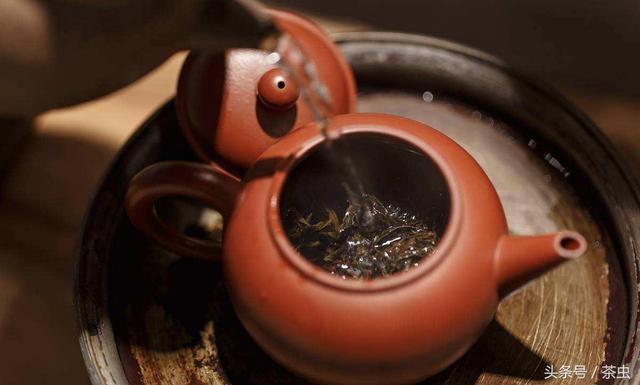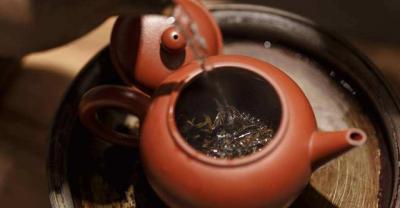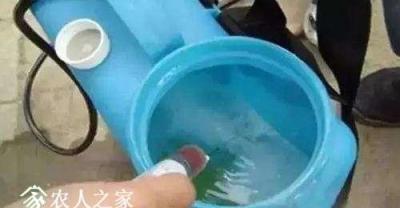Not washing tea is equivalent to drinking pesticides? That is your ignorance, the expert interprets the real function of tea washing!
When it comes to "washing tea", it means to wash the tea leaves with water. Most people who like to drink tea are used to soaking the tea in water for a while and then pouring out the first brew of tea, which is called "washing tea".
Perhaps many tea lovers will be reminded by their predecessors from the first time they drink tea: tea must be washed before drinking. The reason why tea washing is important lies in three factors: pesticides, dirt and psychological level. It is generally believed that in the process of tea growth, unwashed tea is equal to "drinking poison". Even if there are no pesticides after the wind and sun and the influence of the external environment, bacteria or other dirty things will be produced, and some will feel uncomfortable and unclean. So is this the case?
The misunderstanding lies.

The article "washing tea" in the Great Dictionary of Chinese Tea explains: "washing tea removes impurities from the surface of loose tea." Tea children think that "washing away the impurities on the surface of loose tea" can not be regarded as the basis for the existence of the "tea washing" process. When tea children discussed the issue of "washing tea" with a number of tea customers, almost everyone agreed that it was necessary to wash tea. One reason is that there is pollution in the growth, processing, storage, transportation, and sale of tea. Second, there are residues of pesticides and heavy metals, so it is necessary to wash them so that they can drink at ease. Tea grows in the mountain field, especially when the environmental pollution is relatively serious, it is inevitable that there are some pollution such as dust, pesticide, heavy metal and so on.

So, is the tea dirty in the end and does it need to be washed? The so-called dirty is nothing more than the fear of dust, microbes and agricultural residues. There is a certain concentration of dust particles in the air, we eat and talk and even breathe will make a certain amount of dust into the body, tea dust compared to these, it is a drop in the bucket. The vast majority of microorganisms need water for survival, and the reason for the long shelf life of tea is that its water content has been reduced to the lowest, which is not conducive to the growth of microorganisms.

As for agricultural residues, not to mention that the agricultural residues of regular manufacturers will be controlled within the national standards, it is not worth worrying about. Even if there is some "exceeding the standard", it is actually an exaggerated panic-the consumption of tea is only a few grams a day. And it is not like vegetables and fruits that are eaten directly, and the amount of agricultural residues that can be absorbed from tea is really very limited.

On the other hand, if there are really agricultural residues in the tea that are worth worrying about, there is a limited amount of pesticides that can be removed by "washing tea". In order to work, it needs to be well attached to the tea, and it is basically just a good wish to effectively remove them by brewing them on the premise of basically retaining the tea ingredients.

Not only that, experts have also compared the quality of several kinds of tea before and after tea washing, and found that the tea filtered by washing tea has quite obvious aroma and taste, and then through the determination of the components in "washing tea soup". It is also found that this tea soup contains a considerable number of tea ingredients. Thus it can be seen that how much nutritional essence has been washed away by washing tea for 5-10 seconds or more, which is common in our daily life! (this is not the case for every kind of tea) it can be said that what should be washed off has not been washed off, but the nutrients that should not have been washed out have been lost, and the loss outweighs the gain.
The real function of washing tea
According to textual research, the word "washing tea" began in the Northern Song Dynasty and has been used in the drinking program of making tea for nearly 700 years. The Chinese Tea Dictionary explains to "washing tea": "washing tea washes away the impurities on the surface of loose tea, and can induce the aroma and taste of tea."

What do you need to wash? Dirty things, too. Since tea needs to be washed and is defined as dirty, how can dirty things be drunk? It can be seen how inappropriate the word "washing tea" is in the tea art process.
Then there are four essentials of fried tea in the Ming Dynasty: "first, choose water." no, no, no. Second, washing tea: where cooking tea first wash tea with hot soup, remove its dirt, air-conditioning, cooking is beautiful. Third, wait for soup. Fourth, choose a product. "
Therefore, we can conclude that it is necessary to wash tea, but it is not what we call pesticide residues and bacteria and dirt caused by processing and storage. perhaps it is more appropriate to call tea washing tea.
The real function of tea washing is to wash away the air-conditioning (or old gas) left by processing and storage in tea leaves. Second, tea leaves are first moistened by heat, water absorption and moisture to form a sprouting state of leaf expansion, which is convenient for the dissolution of flavor substances and makes tea aroma substances better distributed.
- Prev

It is better for apple trees to make medicine several times a year, what pesticides do they need and when to spray them?
Each kind of fruit tree is different, even big trees and small trees are different. The targets of prevention and control are also different in different regions. The main common pathogens of apple trees are: deciduous disease.
- Next

Which fruits and vegetables have more pesticide residues? Buy according to this article, do not make mistakes, suggest collection
There are many statements about pesticide residues in fruits and vegetables. Water spinach is the absorption of pesticides and heavy metals the most severe vegetables, foreign countries take water spinach to purify the soil, no one...
Related
- Fuxing push coffee new agricultural production and marketing class: lack of small-scale processing plants
- Jujube rice field leisure farm deep ploughing Yilan for five years to create a space for organic food and play
- Nongyu Farm-A trial of organic papaya for brave women with advanced technology
- Four points for attention in the prevention and control of diseases and insect pests of edible fungi
- How to add nutrient solution to Edible Fungi
- Is there any good way to control edible fungus mites?
- Open Inoculation Technology of Edible Fungi
- Is there any clever way to use fertilizer for edible fungus in winter?
- What agents are used to kill the pathogens of edible fungi in the mushroom shed?
- Rapid drying of Edible Fungi

